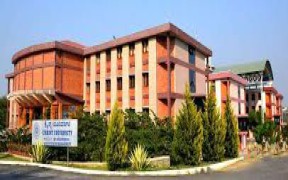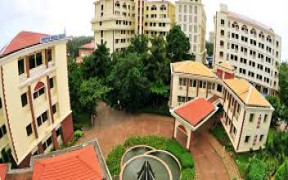Top MSc Food & Nutrition Colleges in Bangalore
MSc in Food & Nutrition is a postgraduate program designed for students who are interested in deepening their understanding of the science of food, nutrition, and dietetics. The program focuses on areas such as nutritional biochemistry, food processing, diet planning, and the role of nutrition in maintaining health. In Bangalore, a hub of higher education and healthcare, numerous colleges offer excellent MSc in Food & Nutrition programs, providing students with ample opportunities to pursue careers in healthcare, research, food industries, and public health sectors.
In this detailed guide, we will explore everything you need to know about pursuing an MSc in Food & Nutrition in Bangalore, including the top MSc in Food & Nutrition colleges in Bangalore, entrance exams, admission procedures, placement opportunities, and career prospects.
List of Top MSc Food & Nutrition Colleges in Bangalore
Bangalore is home to some of the best colleges and universities offering MSc in Food & Nutrition programs. These institutions provide excellent infrastructure, experienced faculty, and strong industry ties to help students build successful careers. Below are some of the top colleges for MSc Food & Nutrition in Bangalore:
Why Pursue MSc in Food & Nutrition in Bangalore?
Bangalore is home to numerous prestigious educational institutions that offer specialized postgraduate courses in Food & Nutrition. Here are a few reasons why pursuing an MSc in Food & Nutrition in Bangalore is a wise choice:
- Reputed Educational Institutions: Bangalore offers world-class educational institutions that provide in-depth knowledge and practical training in food science, nutrition, and dietetics.
- Industry Exposure: Bangalore has a thriving healthcare, food processing, and wellness industry, providing numerous internship and job opportunities for students.
- Research Opportunities: With its prominent research institutions, Bangalore offers ample research opportunities in food science, nutrition, and public health.
- Healthcare & Food Industry Growth: The city is known for its advancements in healthcare and food industries, ensuring that graduates have access to diverse career options.
MSc Food & Nutrition Entrance Exams in Bangalore
The admission process for MSc Food & Nutrition programs in Bangalore usually involves an entrance exam and/or merit-based selection. Entrance exams are typically designed to test the candidate’s knowledge of food science, nutrition, and general science. Here are some of the key entrance exams for MSc Food & Nutrition:
-
Christ University Entrance Exam
- Christ University conducts an entrance exam for MSc programs, including Food Science and Nutrition. The exam assesses the candidate’s knowledge in subjects like Nutrition, Biochemistry, and General Knowledge.
-
St. Joseph's College Entrance Exam
- St. Joseph’s College conducts an entrance exam for postgraduate admissions. The test evaluates the candidate’s knowledge in areas related to Food Science, Nutrition, and Chemistry.
-
Bangalore University Entrance Exam
- Some of the colleges affiliated with Bangalore University conduct their own entrance exams or admit students based on their previous academic performance. The entrance exam focuses on subjects like Biology, Chemistry, and Food Science.
-
Mount Carmel College Entrance Exam
- Mount Carmel College also conducts an entrance exam for MSc Food Science and Nutrition. The exam typically includes questions from Nutrition, Chemistry, and Biology.
MSc Food & Nutrition Admission Procedure in Bangalore
The admission procedure for MSc Food & Nutrition in Bangalore is typically as follows:
-
Eligibility Criteria:
- Applicants must have completed a BSc in Food Science, Nutrition, Home Science, Dietetics, or any related field from a recognized university.
- A minimum aggregate percentage (typically 50-60%) is required in the undergraduate degree.
-
Application Process:
- Students must visit the official website of their chosen college and fill out the online application form.
- They will need to submit documents such as mark sheets, identity proof, and passport-sized photographs.
-
Entrance Exam (if applicable):
- For colleges that require an entrance exam, students need to register for the exam by filling out the application form and paying the exam fees.
- The entrance exam typically tests knowledge in Food Science, Nutrition, General Science, and Biology.
-
Counseling and Interview:
- After the entrance exam results are announced, colleges conduct counseling sessions or personal interviews for shortlisted candidates.
- Final selection is based on exam performance, undergraduate scores, and interview results.
-
Fee Payment and Document Verification:
- After the admission is confirmed, students must pay the course fees and submit their original documents for verification.
Placements After MSc Food & Nutrition in Bangalore
Graduates of MSc Food & Nutrition in Bangalore can explore diverse career opportunities in the healthcare, food, and wellness industries. With Bangalore being a major hub for food processing, healthcare, and research, graduates can secure high-paying jobs in several sectors.
Career Opportunities:
- Clinical Nutritionist: Work with hospitals and healthcare providers to create customized diet plans for patients.
- Dietitian: Assist individuals in managing health conditions through nutrition.
- Food Technologist: Work with food manufacturers to improve food processing and ensure food safety.
- Public Health Nutritionist: Work with government and non-government organizations to improve nutrition in communities.
- Food Safety Expert: Monitor and ensure compliance with food safety standards in food industries.
- Researcher: Engage in food and nutrition research, working with universities, research labs, or international organizations.
- Academia: After completing an MSc, students can choose to teach in universities or colleges offering food and nutrition courses.
Top Employers:
- Hospitals and Clinics: Work as clinical nutritionists and dietitians in leading hospitals and wellness centers.
- Food Industry: Companies such as Nestlé, Britannia, PepsiCo, and Coca-Cola hire food scientists, food technologists, and nutritionists.
- Government and NGOs: Public health nutritionists are often employed by government health departments, non-governmental organizations (NGOs), and global health agencies.
- Research Institutions: Leading research institutes such as the Indian Council of Medical Research (ICMR) and the Indian Institute of Food Processing Technology (IIFPT) offer opportunities for researchers.
- Academia: Many universities and colleges recruit MSc graduates as faculty members.
Salary Prospects:
- Entry-Level: MSc Food & Nutrition graduates typically start with a salary range of INR 4-6 LPA depending on the role and organization.
- Experienced Professionals: With experience, professionals can expect salaries between INR 7-12 LPA, especially in clinical nutrition, research, and the food industry.
Conclusion
An MSc in Food & Nutrition from a reputable institution in Bangalore opens up numerous career opportunities in healthcare, food industries, research, and public health. Bangalore’s advanced healthcare and food industries, combined with world-class academic institutions, make it an ideal destination for pursuing this program. With ample placement opportunities and a growing demand for nutrition and food experts, pursuing MSc in Food & Nutrition in Bangalore can lead to a fulfilling and rewarding career.
FAQ's for MSc Food & Nutrition Colleges in Bangalore
During the MSc Food & Nutrition program, students acquire practical skills in food analysis, dietary planning, nutrition counseling, and conducting health assessments. They also engage in internships and fieldwork to gain hands-on experience in real-world nutrition scenarios, preparing them for a successful career in the food and health industry.
MSc Food & Nutrition is a promising career option due to the increasing awareness about healthy eating and its impact on well-being. As nutrition-related diseases rise globally, trained nutrition professionals are in high demand. Graduates can pursue diverse career opportunities in healthcare, food industries, and government sectors.
Clinical nutrition is an important aspect of the MSc Food & Nutrition program, where students learn how nutrition can aid in the treatment and management of diseases. Clinical nutritionists provide dietary plans to patients with conditions like diabetes, hypertension, or cancer, helping them manage their health effectively.
Yes, there is a significant demand for food technologists in the food industry after completing MSc Food & Nutrition. Food technologists work on product development, quality control, and ensuring that food products meet nutritional, safety, and regulatory standards. This is a growing field with plenty of opportunities.
Community nutrition plays a vital role in the MSc Food & Nutrition program. Graduates are trained to assess and address the nutritional needs of communities, design public health nutrition programs, and promote healthier lifestyles at the population level, focusing on disease prevention and health promotion.
Graduates of MSc Food & Nutrition have great scope in the international market as nutrition and food safety concerns are global. Professionals can work with international organizations, healthcare centers, and food companies, contributing to global nutrition policies, food security programs, and research in nutrition science.
The MSc Food & Nutrition program prepares students to tackle the growing healthcare challenges such as obesity, malnutrition, lifestyle diseases, and food security. Students learn to design nutrition programs, conduct research, and apply evidence-based practices to improve the nutritional health of populations.
Yes, the MSc Food & Nutrition program offers specializations in areas like clinical nutrition, community nutrition, food technology, sports nutrition, and public health nutrition. Specializing in a specific field allows students to gain expertise and focus their careers in their area of interest.
Nutrition counseling is a key component of the MSc Food & Nutrition program. Graduates are trained to provide personalized dietary advice and support to individuals based on their specific health needs. Nutritionists guide clients on managing chronic diseases, weight loss, or improving overall health through proper nutrition.
Food safety is an integral part of the MSc Food & Nutrition program. Students learn about foodborne illnesses, food contamination, and safety regulations to ensure the health and safety of consumers. They also acquire skills in developing food safety protocols and ensuring the safe production, handling, and consumption of food.
Graduates of MSc Food & Nutrition can work in a wide range of job roles, including dietitian, clinical nutritionist, food technologist, food safety officer, health educator, food quality analyst, and wellness consultant. They can work in hospitals, research labs, NGOs, food companies, and health organizations.
The MSc Food & Nutrition program is crucial for the food industry because it trains professionals to ensure the nutritional quality, safety, and health benefits of food products. Graduates can work in food technology, product development, quality control, and regulatory roles, ensuring that food products meet the required nutritional standards.
The average salary for MSc Food & Nutrition graduates in India can vary depending on the role and experience. Entry-level positions can offer salaries between ₹3,00,000 and ₹5,00,000 per year, while experienced professionals can earn upwards of ₹7,00,000 annually. Salary can also depend on the sector (government, private, research, etc.).
The MSc Food & Nutrition curriculum includes subjects like biochemistry, food science, clinical nutrition, community nutrition, food safety, dietetics, research methodology, and public health nutrition. The program combines both theoretical lessons and practical experience to ensure students are prepared for a successful career.
While both the MSc Food & Nutrition and MSc in Dietetics focus on nutrition and health, the key difference lies in the approach. MSc Food & Nutrition tends to focus more on the scientific and research aspects of food, nutrition, and health, whereas MSc in Dietetics is more clinical and practice-oriented, emphasizing diet planning for patients.
The scope of MSc Food & Nutrition in the healthcare industry is vast. Graduates can work as clinical nutritionists in hospitals, providing dietary counseling and nutrition support for patients. They can also be involved in promoting healthy eating habits, managing weight, and designing nutrition interventions for various medical conditions.
While a background in food science, nutrition, or a related field is preferred, some universities may admit students from other disciplines such as home science or biology, provided they meet the required criteria. A strong foundation in basic sciences like biology and chemistry can help students succeed in the program.
Enquire Now
Top 10 MSc Food & Nutrition Colleges in Bangalore
Top Courses

List of Best 10 Colleges in Bangalore
- Yenepoya University Bangalore
- Navaneetham College of Nursing Bangalore
- Vanshika Group of Institutions Bangalore
- Hita College Of Nursing Bangalore
- Samvaad Institute of Speech and Hearing Bangalore
- Sampoorna Group of Institutions Bangalore
- Naseema Institute of Speech and Hearing Bangalore
- Dr. S.R Chandrasekhar Institute Of Speech And Hearing Bangalore
- Chanakya University Bangalore
- Acharya Institute of Health Sciences Bangalore







